Ondrej Markus
Entrepreneur in ed-tech, building the future of education as a founder and CEO at Playful.
I write about the future of education, designing learning games, and running a startup.
I'm a generalist, introvert, gamer, and optimizing to be useful.
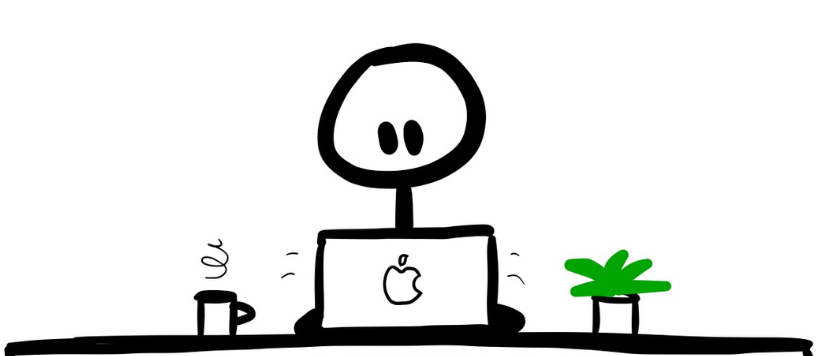
How to be as useful as you can
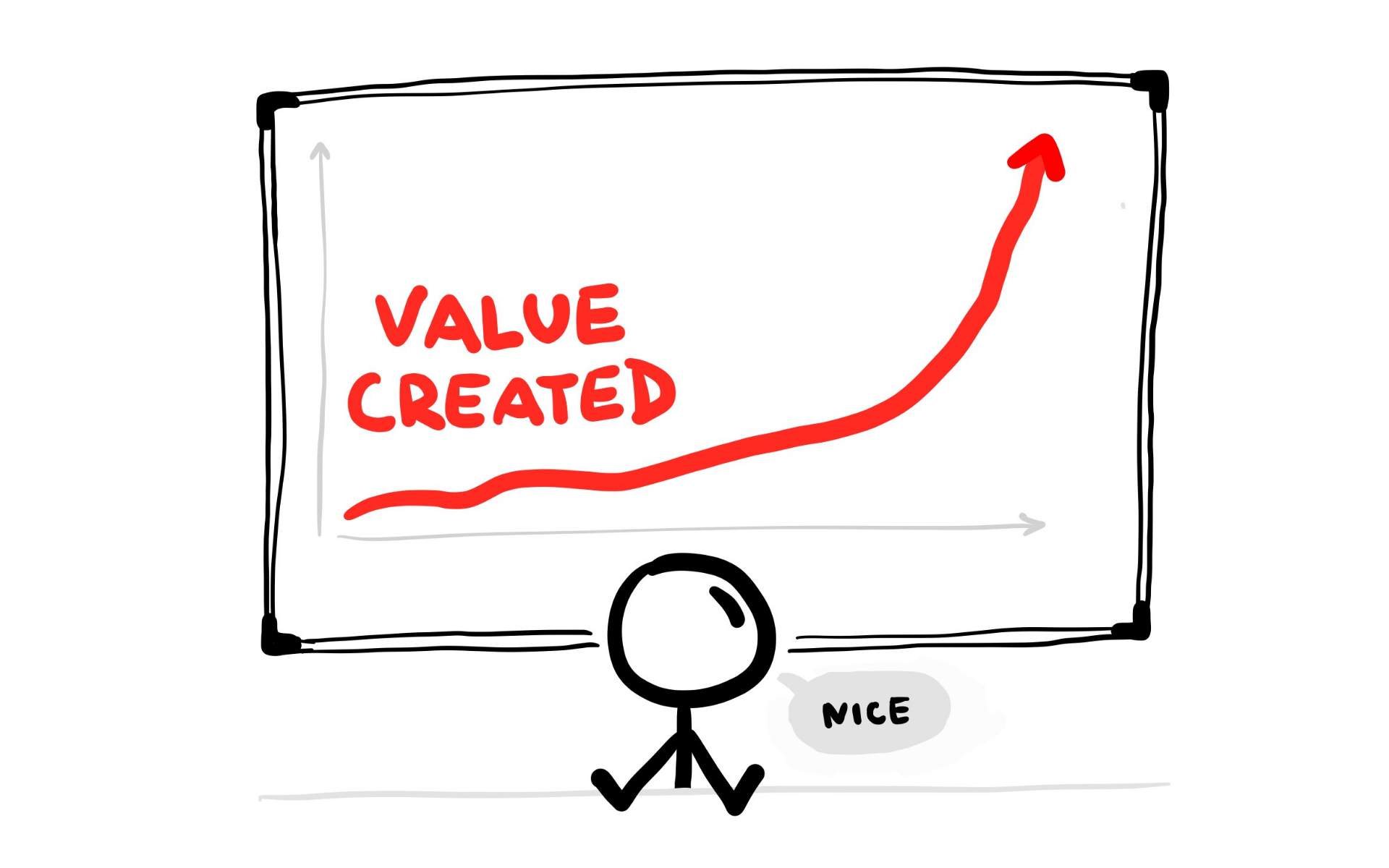
3 years ago, I was in a dark place.
I just left a business I was building for the last 2 years from nothing to millions in revenue. What we were doing didn’t feel enough to me. So I moved on to starting something new. I just didn’t know what’s it going to be yet.
But I knew one thing. I wanted my next project to make a real positive difference in the world.
So I jumped deep into research and studied topics from world hunger to automation to education. The novelty was exciting but overwhelming. I didn’t know what to do.
I just so so wanted to seize the right opportunity and do the greatest good possible. It felt like I carried the responsibility for saving the world on my back 24/7.
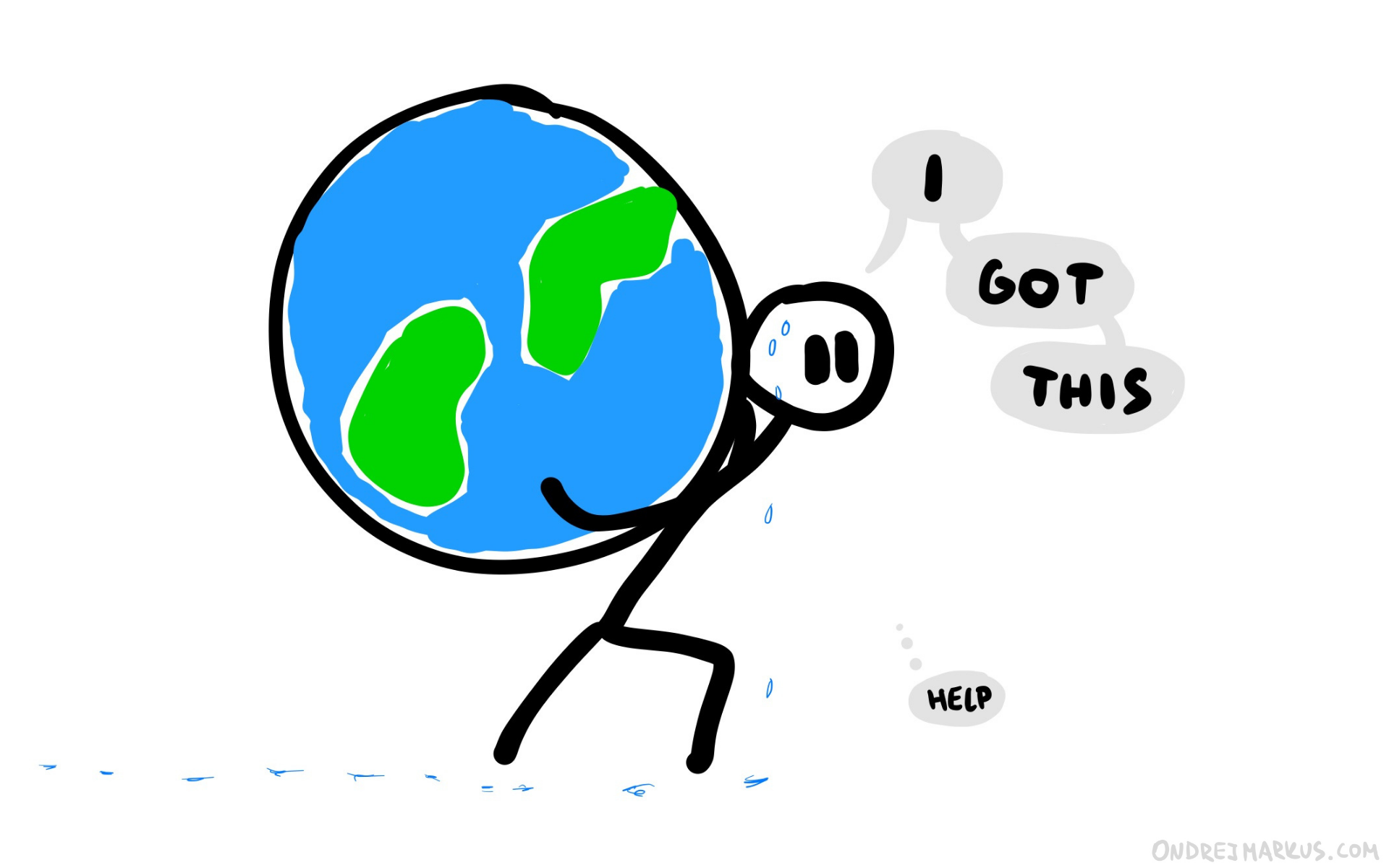
Life crushing responsibility to save the world
The burden was crushing me. I thought I need to pull off something huge and do it yesterday. It felt like I’m late already.
I tried starting several projects, but nothing worked. I didn’t understand the problems enough, and, to be honest, I didn’t even enjoy working on them. I just wanted to do the right thing. I wanted to be as useful as possible.
This was one of the darkest periods in my life.
It might not have looked that way because I was always excited about this or that new project. I always had something going on.
However, I was constantly anxious I wasn’t doing enough.
“I’m still not working on the project of my life. Therefore I’m useless."
It took me several months of pretty toxic thoughts and one failed business idea to realize this mindset is not working for me at all. It was self-destructive.
These days, I still strive to be as useful as I can, but my approach has changed.
So, how to be as useful as you can?
Play the long game
It’s reasonable to expect both you and me will live to 80 or more. So if we try to be as useful as possible, we should consider the next 20, 30, 50 years of our life, not just the next 1 to 5 years.
Creative thinkers do their best work at various ages. There is no reason why you shouldn’t be able to succeed at 60 or later, as long as you try your best all the way.
There is a saying: “If you gave me 4 hours to cut down a tree, I’d spend the first 3 hours sharpening my ax.”
Apply it to trying to be as useful as you can over your lifetime: “If you gave me 75 years of life, I’d spend the first 50 years learning.”
Prioritize learning
To be as useful as you can over your lifetime, the best thing you can do is focus on learning.
Imagine yourself in 30 years if you kept getting better every day. Your ability to have a positive impact would be 10 or 100 or 1000 times higher than it is today.
So if we care about being as useful as possible, it doesn’t matter WHEN the added value happens as long as it happens with the greatest result possible.
Let’s compare two different mindsets.
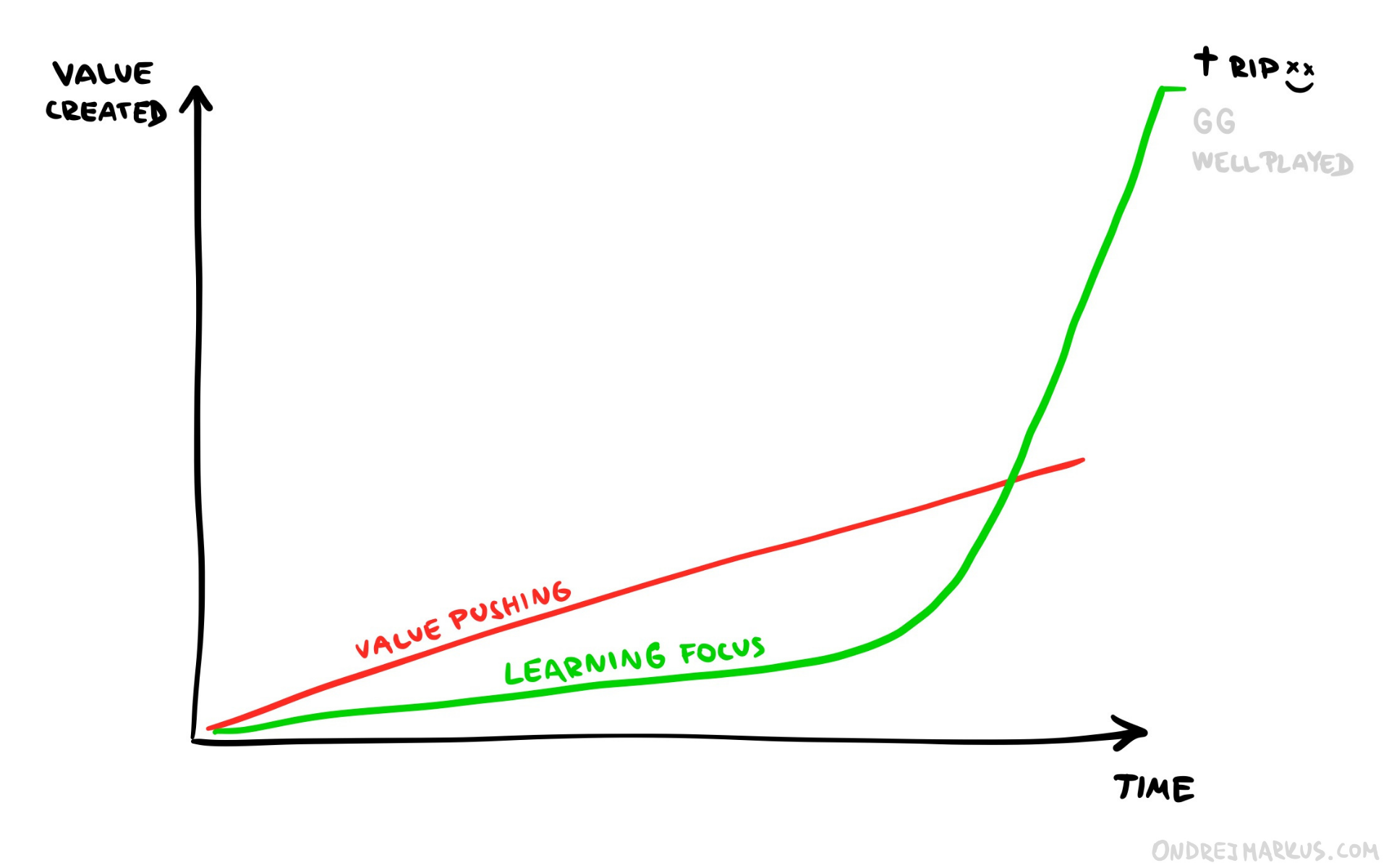
Value Created over Time
- Value Pushing – This is me 3 years ago. I was so focused on being maximally useful that it hurt my learning and mental health. However well-meant this is, it’s shortsighted, ineffective, and borderline toxic for your wellbeing.
- Learning Focus – This is playing the long game where optimizing for learning is the chosen value engine. You navigate your work-life based on where you can learn the most, and you are okay with being most useful later in life when you’re on top of your game.
As you learn new things, develop skills, grow your network of people, and become wealthy, your leverage for creating value increases.
This is the best way to become a Super-changemaker – someone whose skills and resources channeled into a project will change the world for the better.
Learn by doing
Okay, just to be clear, I don’t propose you go into hiding for 30 years and read the shit out of Wikipedia. Don’t.

Don’t.
The best way to learn anything is to apply it to a concrete project. You want to learn by doing whenever you can.
When knowledge meets reality, a skill is born.
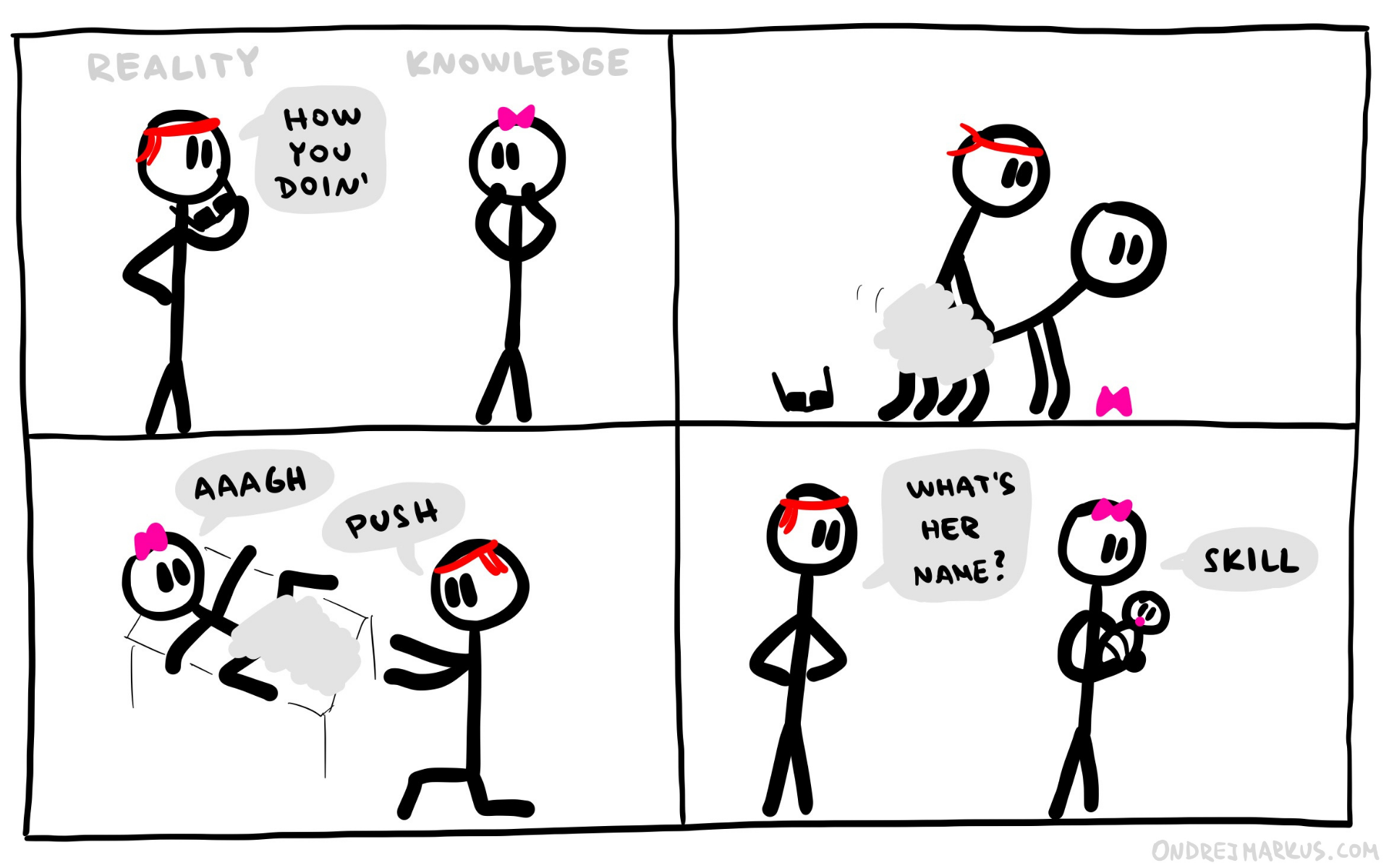
When knowledge meets reality, a skill is born.
The learning-by-doing approach has several upsides:
- Chance-taking: When you’re creating things as you go, you never know. Despite your mediocre skills, you might get lucky and create something amazing because you had the right idea at the right time.
- Risk diversification: Our life expectancy is just statistics. A bus could get you tomorrow, or some nasty disease in a few years. Doing useful things right away protects against the worst-case scenario.
- Having fun: Creating things is more fun than studying books.
Now you might think: “Hey, this sounds the same as Value Pushing. You’re creating something useful right now. What’s the difference then?”
Awesome question. I was just going to talk about this.
Quit faster
When you learn by doing, the crucial difference between Value Pushing and Learning Focus is timing.
Quit projects once you stop learning.
I know, it sounds harsh. Let me elaborate.
In general, we tend to stay too long in dead-end jobs or projects with nothing to offer us except paying the bills.
Why do we stay?
Basically, because we are a bunch of people-pleasers terrified of looking unreliable and disloyal. This attitude made sense 10.000 years ago when if you pissed off the other 30 of your tribe members, you be dead.
We drag this fear with us, but if you think about it, nothing terrible would happen to you if you changed jobs every 6-12 months. Sure, some traditional companies wouldn’t touch you with a 3-meter stick because they aren’t built for people like you. Fuck’em. You’d learn faster and that’s what matters.
I don’t know about you, but I’ve never regretted leaving a job, project, or relationship too soon. I only ever regretted staying longer than I should have.
Overstaying in bad situations is natural. It’s mental insurance against regret. But the lesson remains the same: Quit faster.
Okay, I am a bit too harsh here to make a point. Navigating projects with other people is complicated. So, hopefully, this goes without saying (but I will say it anyway):
Don’t be a dick. Rushing 100% your way with zero compassion will ruin your reputation despite good intentions. Actions matter more than intentions.
The formula for staying friends with people even though you leave them is: always be honest and polite. Tell them how things are with you from the beginning, and tell them how things are once it’s time to move on.
If you stay honest, they might not like your decision, but they won’t feel hurt or betrayed. They might be disappointed but will get over it soon. As long as you don’t lie or twist reality to your advantage, people will respect you. Your reputation and integrity will remain intact.
If they get pissed no matter your honesty, that’s their problem. Why make sacrifices for people who don’t wish you the best? They are the dick in the room. You’re better off without them. It’s not your job to make other people happy.
Always keep learning and quit ruthlessly any project where you do not. That’s how you maximize learning over the long term.
Okay, this wasn’t even the most selfish part yet… :D
Be selfish first
Being selfish first is the most generous thing you can do for the world.
Your first responsibility is to take care of yourself. Because if you can’t take care of yourself, you’re dead weight for everyone. So your top priority should always be you. Get rich, get healthy, get happy.
The secret here is to enjoy your work and life every day because that’s when you are at the top of your game. You learn the most and, eventually, contribute your best work to improving the world.
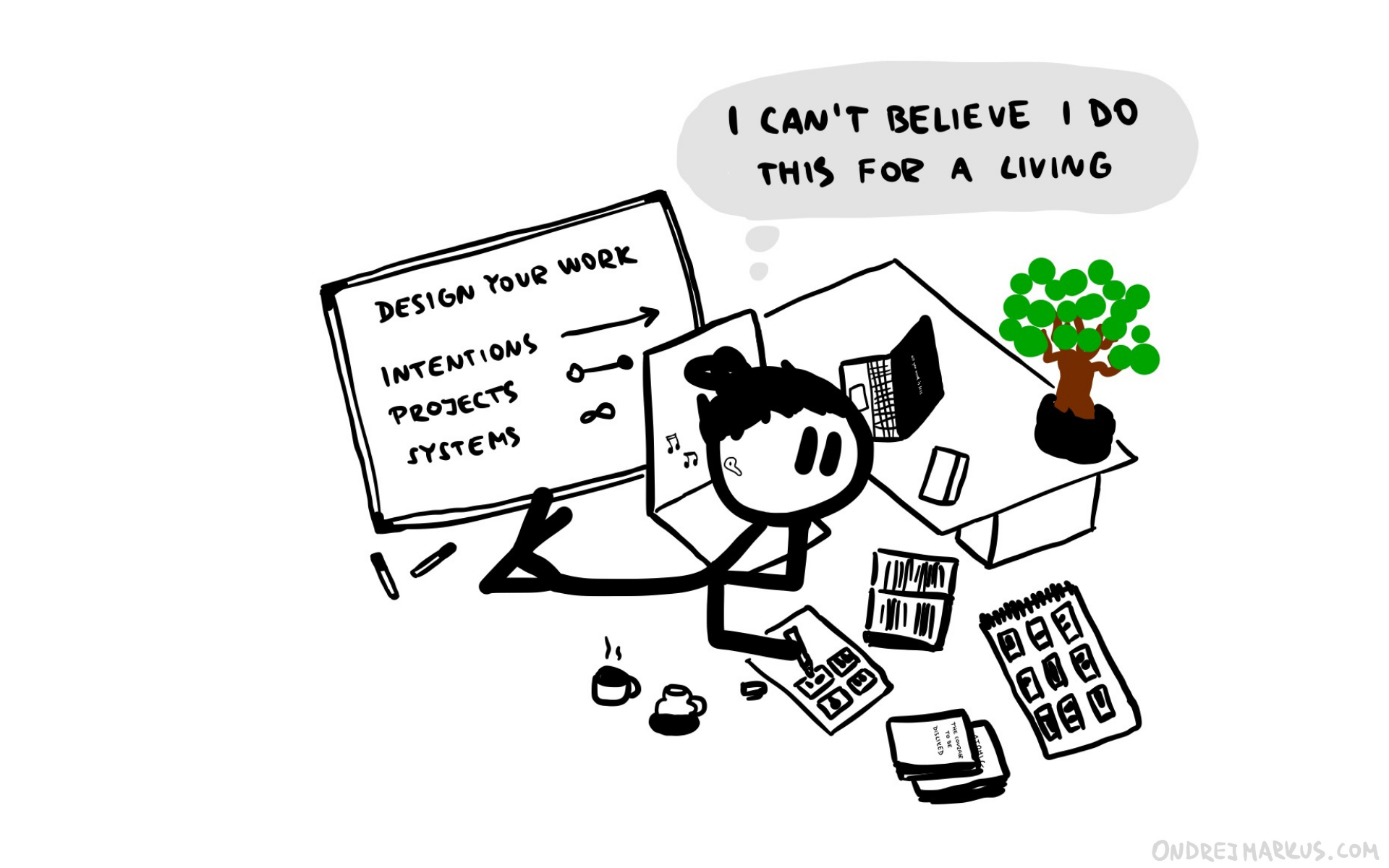
I know I’m saying it like it was easy. It’s not easy. It’s a neverending process of self-improvement through trial and error. It’s the hardest thing you’ll ever pull of, but it will be worth it.
To close this off, let me say this.
This approach isn’t about creating an excuse to being a self-centered asshole while declaring it’s for the greater good. No.
Also, there is nothing wrong with wanting to do good. It’s amazing more people seem to care about it. But our longing for doing good can get toxic and unproductive if it’s unmanaged. It’s important to be smart about it:
- Play the long game
- Prioritize learning
- Learn by doing
- Quit faster
- Be selfish first
The most generous thing is to be a selfish learner first.
Get good before you do good.